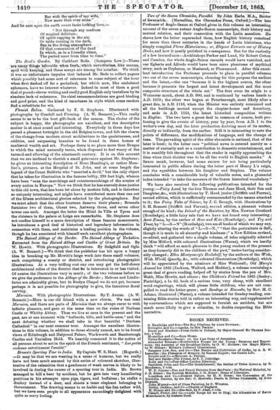Two of the Saxon Chronicles, Parallel. By John Earle, MA.,
Rector of Swanwick. (Macmillan, the Clarendon Press, Oxford.)—The late Professor of Anglo-Saxon at Oxford gives in this volume an interesting account of the seven extant Anglo-Saxon manuscripts, their history and mutual relation, and their connection with the Latin annalists He shows how the latter superseded them, how English history remained for more than three centuries in the hands of Latin historians, who simply compiled Flores Historiarwn ; or, Elegant Extracts out of History Books, and how it nearly perished in consequence. But for the curiosity of a few learned men—Archbishops Parker and Laud, Sir Robert Cotton and Camden, the whole Anglo-Saxon records would have vanished, and our Egberts and Alfreds would have been Mere phantoms of mythical story, such as Cophetua, or Moelmud, or Pharamund. After this excel- lent introduction the Professor proceeds to place in parallel columns two out of the seven manuscripts, choosing for this purpose the earliest and the latest,—the one "because it is the highest source, the other because it presents the largest and latest development and the most composite structure of the whole sot." The first owes its origin to a Worcester monk, about A.D. 900, and is continued by various hands to A.D. 1070; the other was begun at Peterborough, most likely after a great fire, in A.D. 1116, when the Minster was entirely consumed and all the buildings around except the chapter-house and dormitory, and ends in A.D. 1151, the latest historical composition written in .Englisc. The two have a great deal in common of course, both pro- fessing to give the events of history, year by year from A.D. 1 to the writer's own day, and the later production deriving most of its matter, directly or indirectly, from the earlier. Still it is interesting to note the points of difference, the modifications of language, and the change of tone. The pervading spirit of the older chronicle is national, that of the later is local; in the latter case "political news is entered merely as a matter of curiosity and as a contribution to domestic entertainment, and it is sensibly felt throughout that the reader is rapidly approaching the time when their cloister was to be all the world to English monks." A Saxon monk, however, had some excuse for not being particularly interested in public affairs during the latter part of Henry L's reign, and the squabbles between his daughter and Stephen. The volume concludes with a considerable body of valuable notes, and a glossarial index intended "to take the measure of the Saxon historical vocabulary."


































 Previous page
Previous page